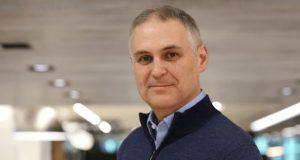When skilled operatives from ISS’s hotel and transport sectors were rapidly redeployed to work at the Nightingale Hospital London a comprehensive training programme was in place to ensure they were all ready for their new front-line roles
The UK Government has had longstanding plans to cope with a global pandemic – in fact the Emergency Planning College periodically runs exercises to look at what the effects would be, and the arrangements needed to cope. When the COVID-19 virus first erupted in Wuhan, Hubei Province in December 2019, then took hold in Northern Italy and was finally a pandemic by the WHO on the 11 March 2020, decisive action was required to meet the threat.
In the United Kingdom, a team of senior clinicians formulated a concept of how the NHS could best cope with the influx of patients when the pandemic reached its height. It took just six weeks from that first meeting to having a 4,000 bedded temporary hospital ready for operation, thanks to some incredible teamwork between the NHS, the military and selected contractors all working together in partnership.
EXCEL LONDON
The initial site identified was the ExCeL exhibition centre in London’s Docklands. The NHS and British Armed Forces surveyed the site over one weekend and the trusted key contractor, ISS Healthcare, who were asked to supply expertise and soft FM services including healthcare cleaning, portering, non-clinical waste management, pest control and helpdesk. They were also tasked with the supply of consumables, materials management and the coordination of waste and catering services. An ISS Healthcare senior management team headed up by Catherine Horne – who had been responsible for much of ISS Healthcare’s London operational business – and supported by Shannon Simpson, were swiftly able to deliver the materials and services required for this fast-track project. To resource such a major undertaking needed many trained specialist operatives and the planned shutdown of other private sector FM projects proved to be timely.
TRAINING
Through an ISS job retention scheme, skilled operatives from the hotel and transport sectors were rapidly redeployed to the Nightingale Hospital London – the nearby Sunborn Yacht hotel, also managed by ISS, was used both for accommodation and as a training academy to educate the staff in hospital-specific processes. This is a concept ISS Healthcare had already introduced into a number of their NHS client’s Trusts (see https://www.fmj.co.uk/healthy-results/) as a way of providing realistic role-based training, coaching and competency evaluation. For the Nightingale Hospital London, candidates received a half-day induction course covering compliance, visitor access, vehicle and fire safety, site do’s and don’ts, accident reporting, useful contacts and infection control. This was then followed by a half-day practical course covering such techniques as mopping, use of cleaning equipment and donning/ doffing PPE to go into high-risk ward areas. To date, ISS has trained over 620 staff.
HSEQ Business Partner, John Kersey explains: “ISS has a strong emphasis on health and safety; it underpins all our activities. Consequently, to support the mobilisation of the ISS Nightingale operation, HSEQ Manager Joel Crompton was deployed to site and involved from the start in setting up a HSEQ management system drawing upon his expert knowledge of healthcare issues. The 2019 recipient of the International Safety Award for Healthcare, Crompton was an ideal candidate to fill this role. As the operation ramped up, further HSEQ resources were drawn in to ensure compliance kept pace with the breakneck pace and ever evolving nature of the project. Good safety practice was emphasised during the project including starting morning briefing sessions with a Safety Moment, communicating the importance of social distancing and engaging with service leads during the risk assessment process.”
COLLABORATIVE APPROACH
Naturally in a collaborative project various parties are involved; over 160 contractors including Armed Forces personnel carried out a range of mobilisation activities, from laying vinyl flooring and installing piped-in medical gas supplies. All these were coordinated through the Mace Group as project managers and CFES as site coordinators.
It is also the nature of private contracting that companies such as ISS must be agile and mobilise their operations in a short timescale. In normal circumstances there is a period of familiarisation during the bidding and tendering process – for the Nightingale project this period was collapsed due to the immediacy of the requirement. Chris Ash, Managing Director of ISS Healthcare, summed this up saying: “The project shows what can be achieved when all parties work for a common goal and normal procurement barriers are removed. The interaction, communication and collaborative working of all companies under the banner of the NHS, along with the military, it is a clear testament to the British ‘can do’ attitude in times of crisis.
The London NHS Nightingale hospital was officially opened by HRH Prince Charles (via video link) on 3 April where he remarked that “Florence Nightingale, the lady with the lamp, brought hope and healing to thousands in their darkest hour. In this dark time this place will be a shining light.” The hospital is currently run under Barts Health NHS Trust.
Logistically, this is a huge site. Anyone who has attended an exhibition or event at the ExCeL London will appreciate how vast it is – over 1km between the east and west doors!
 From an operational point of view, the soft FM teams are now available 24/7, with individuals working a 12-hour 4 on – 4 off roster. The onsite management team meets regularly to agree the resourcing requirements and solutions, but currently the signs are that perhaps we will not need such a large facility, but the point is, at the time of planning, we simply didn’t know what to expect and it was much better to have been prepared and not required than facing a total lack of resource.
From an operational point of view, the soft FM teams are now available 24/7, with individuals working a 12-hour 4 on – 4 off roster. The onsite management team meets regularly to agree the resourcing requirements and solutions, but currently the signs are that perhaps we will not need such a large facility, but the point is, at the time of planning, we simply didn’t know what to expect and it was much better to have been prepared and not required than facing a total lack of resource.
The NHS Nightingale Hospital London is up and running. Indeed, the first patient has since been successfully discharged, thanks to the extraordinary commitment of so many people – the whole FM industry can take pride in that.




